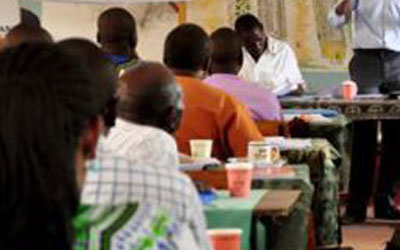Heart, brains and muscle needed in East Africa’s oil boom
 Photo: http://bit.ly/1mubTvO
Photo: http://bit.ly/1mubTvO
The region is sitting on enough wealth to become a hub of peace and prosperity, but how are transparency and citizen voice being enabled?
This post is based on my remarks today at an event Oxfam is co-sponsoring with the Brookings Institution to examine East Africa’s oil and gas boom and its potential impact on poverty. You can watch a webcast of “East Africa’s Oil and Gas Boom – Promise and Peril” here and join the conversation on Twitter #AfricaOilGas.
East Africa is experiencing a boom in oil and natural gas that could transform the region. The region. How will this occur?
Oxfam does not believe natural resources are a curse, but the experience of resource rich countries is well known and sobering. We foresee a world beyond aid, when revenues from oil, minerals and gas might help drive inclusive economic growth.
Oxfam has been working to help make that a reality based on a simple theory of change: Transparency and citizen voice can protect rights and bend government investments toward poverty reduction.
The question is: Is this blend of transparency and citizen voice working?
For years, Oxfam worked with colleagues in the Publish What You Pay coalition to pass legislation in the US to make oil and gas payments more transparent. Oil companies were supportive of these efforts and fine with voluntary initiatives. But when the 2010 Dodd-Frank Act threatened to impose transparency burdens on them that competitors might not face, they sued the US Securities and Exchange Commission.
It’s the same story with citizen voice: it’s all fun and games, until it isn’t. All over the East Africa region, as civil society becomes more powerful and more connected to citizens, governments are willing to embrace democratic and transparency norms…but only up to a point.
For example, at the Open Government Partnership meeting late last year, I heard Tanzanian President Jakaya Kikwete embrace civil society voice and transparency, without a hint of irony, even though the Tanzanian government had just closed down two newspapers for publishing government salary structures.
The Kenyan government recently tried but failed to pass new civil society restrictions that would stifle local advocacy efforts, and then passed a law in January that deeply threatens Kenya’s free media.
This shows that the transparency and citizen voice agendas are working. We are getting close.
What happens with this agenda in the next five years, may determine whether these countries follow Botswana, which harnessed its diamond wealth to become an upper middle income economy, but with distressing levels of poverty, or follow Chad, where oil wealth saw military spending go up 633 percent from 2000-2009 and a much-vaunted World Bank-backed pipeline project collapsed.
As some oil corporations and government push back on transparency and citizen voice, civil society organizations need to start talking and thinking about heart, brain and muscle.
First, we will have to show more heart as the politics become rough. But let me be clear: this is not about partisan politics. It is about recognizing that transparency and accountability are concepts that only become meaningful if they redistribute power and ultimately resources from the haves to the have-nots. It is about finding a way to remain in the game with the poor and marginalized, and those who struggle for them, when the haves decide that civil society is getting too close to the golden egg.

Second, we need to use our brains more if we are going to engage citizens in this agenda. When was the last time any of us engaged a local politician in a budget discussion? We must get creative if we are going to connect our agenda to people’s real lives in politically-salient ways. Some success stories offer insights, like the Ghana “Oil for Agriculture” campaign, which led to a commitment by government to allocate more oil revenues into programs that support small holder farmers. Overcoming the rational ignorance of busy people is where much of our political relevance lies, and that will require the brain power for better research and new ways of using data and technology, and more local and global imagination generally.
Third, we must all recognize that local public institutions are like muscles. If you want them to grow strong, you need to use them. Last year in Ghana, Oxfam America’s Senior Policy Manager for Extractive Industries Ian Gary and I followed the oil money trail from the central government through the common fund to regions and to a district assembly and then to a village. At every point in this journey, there was clear leakage, but there was also a palpable sense that shining a spotlight on oil money could boost both democratic strengthening and economic growth. I was back in Ghana two weeks ago, and discussed with our team there how constant press scrutiny and savvy civil society engagement and research (including value for money audits) was finding these leaks and challenging the government to address them.
If development CSOs ever thought that their major function was to transfer stuff from wealthy to impoverished communities, those days are over. The challenge for activists is to be relevant in changing fundamental relationships of power that determine if public funds are used most effectively for development. To do that we must have the heart to embrace political risk, the brain to work out how to engage busy people, and the muscle to help local institutions deliver what they need to their citizens.
As the East Africa oil and gas boom makes clear, much of the human and natural wealth needed to address poverty sits in the countries where extreme poverty survives. It’s time for us to recognize that the future of East Africa and its natural wealth will be determined by the politics and power of its people.